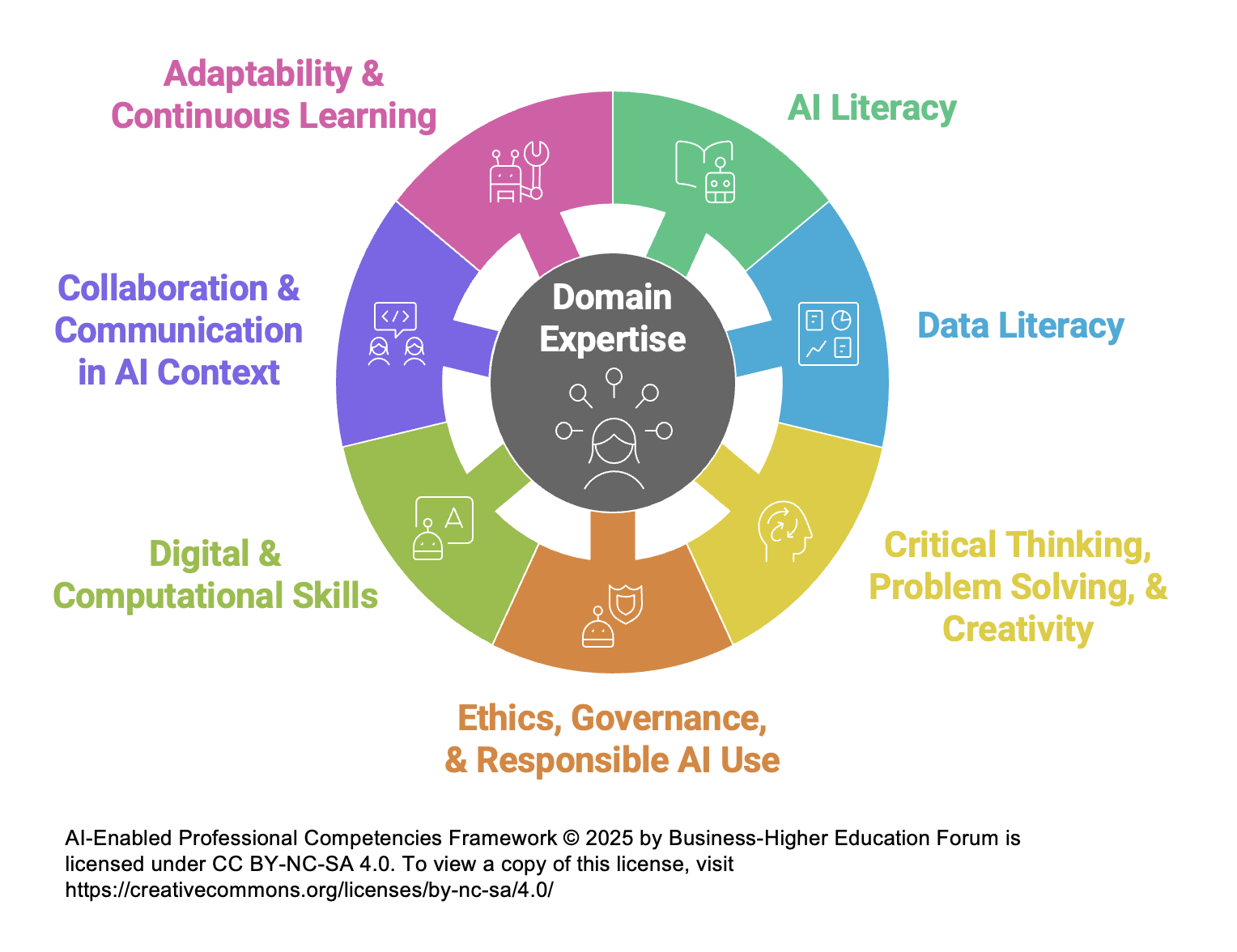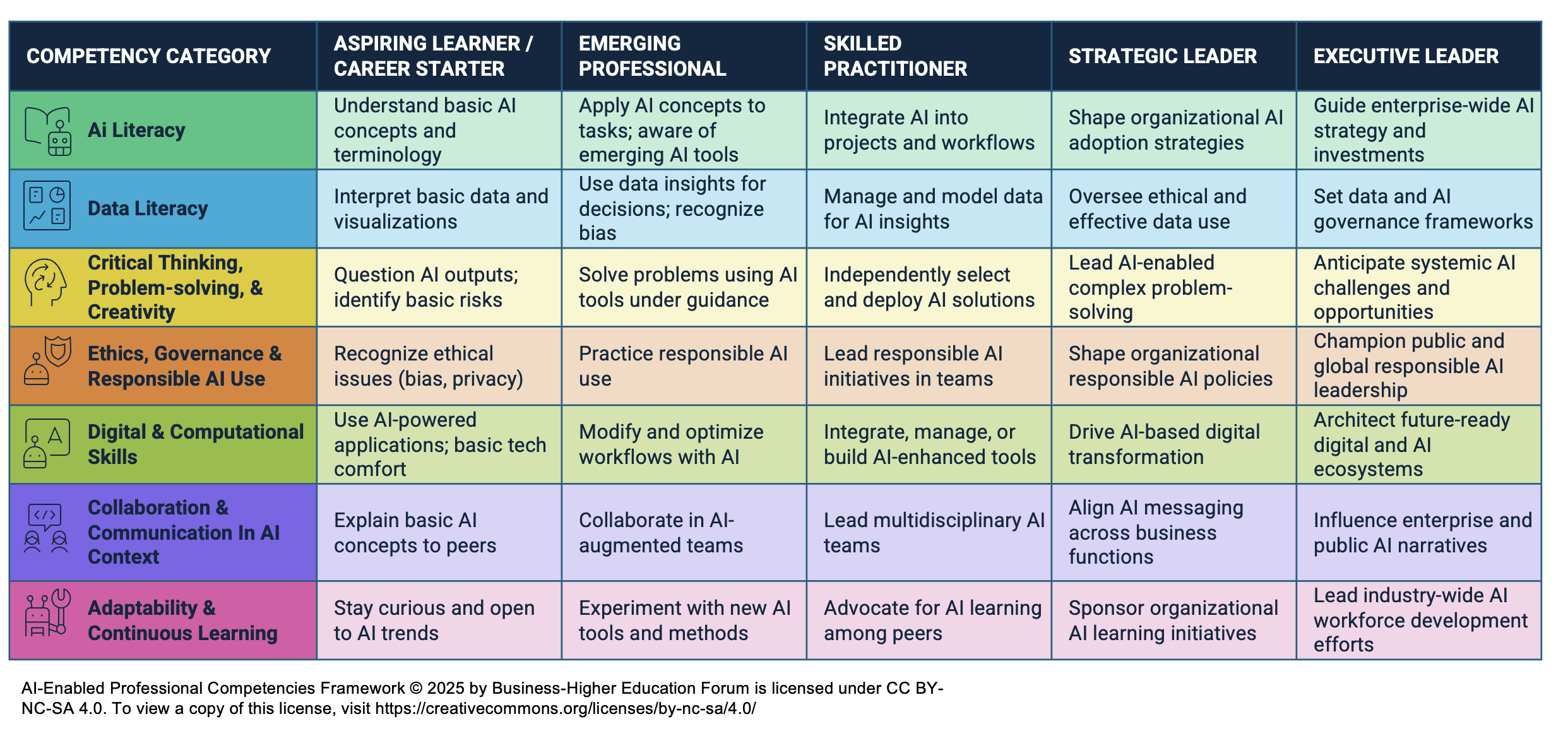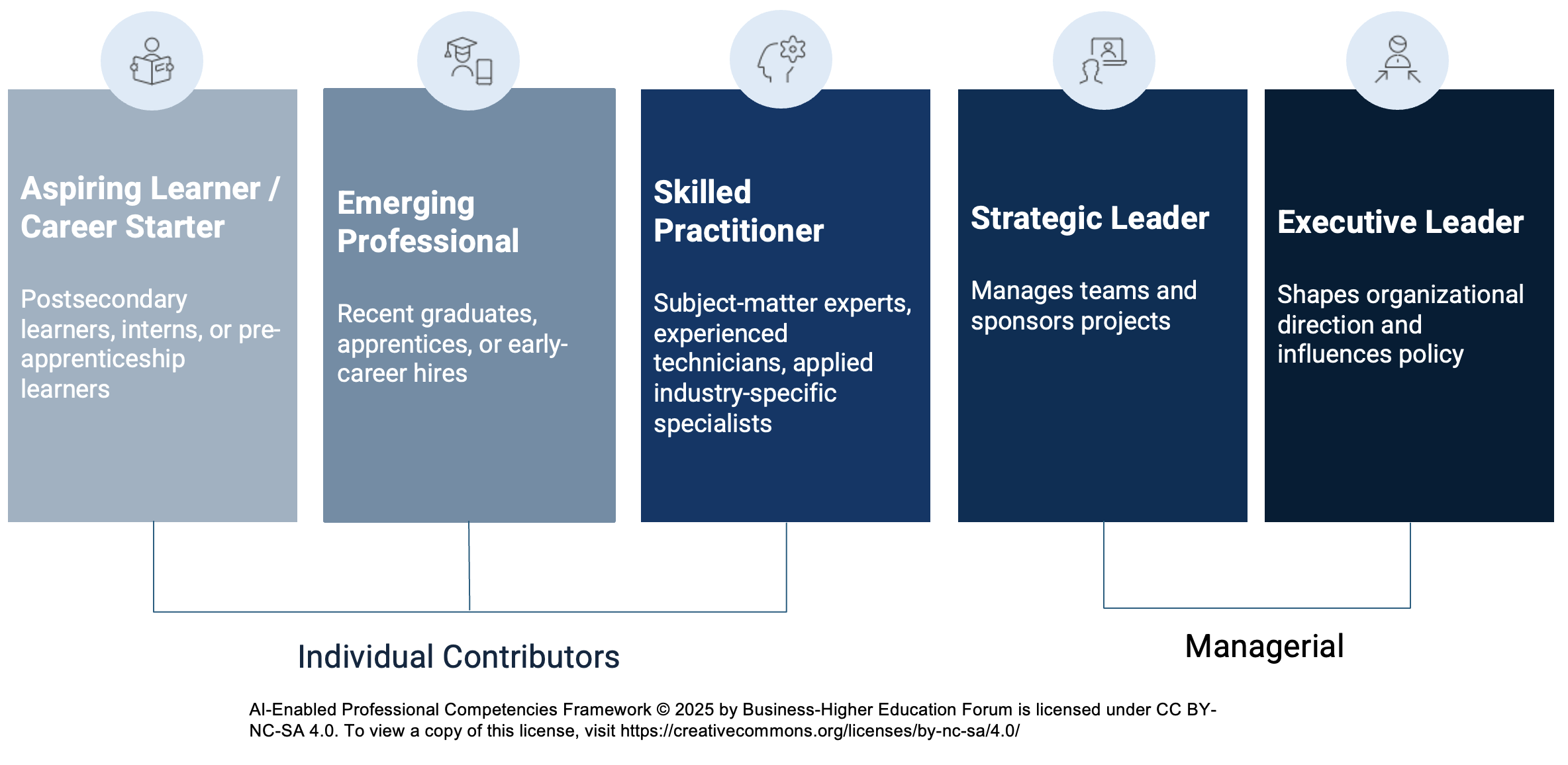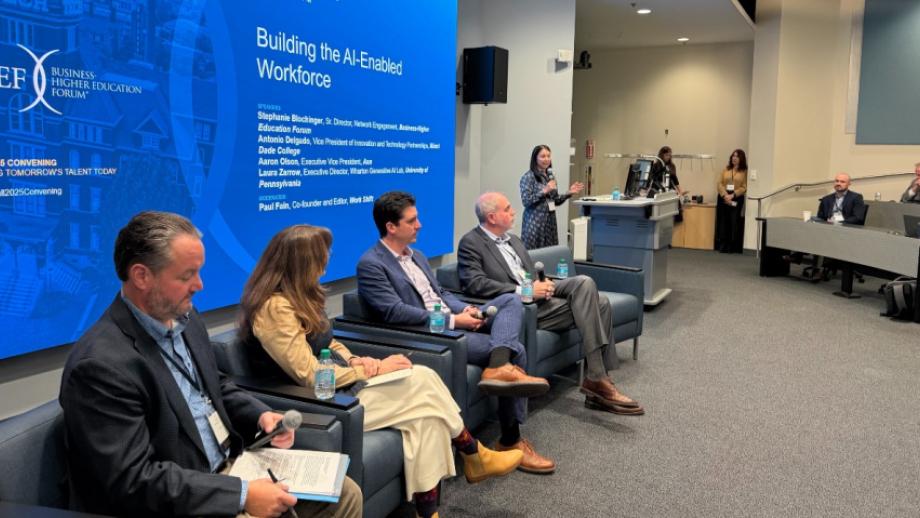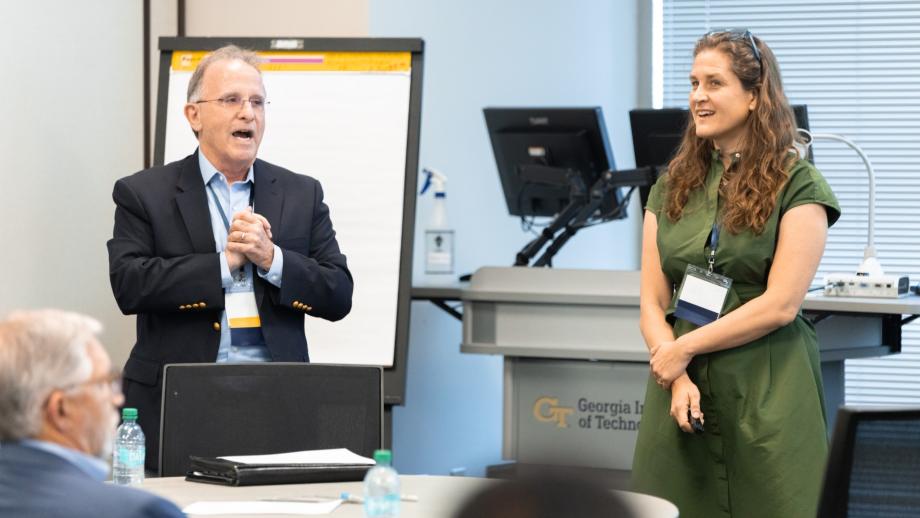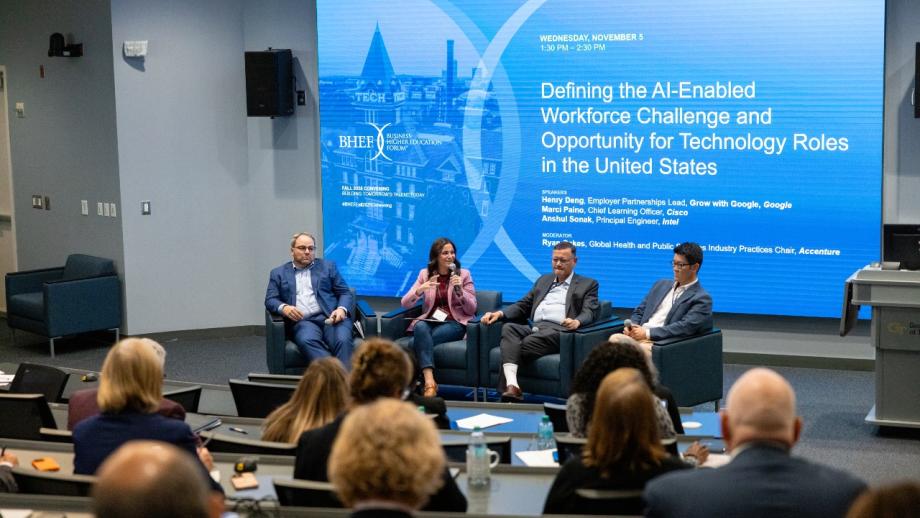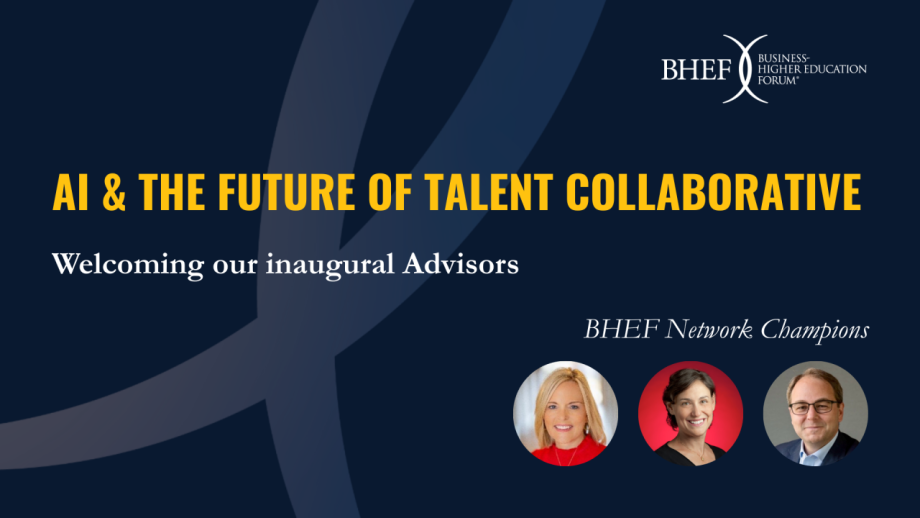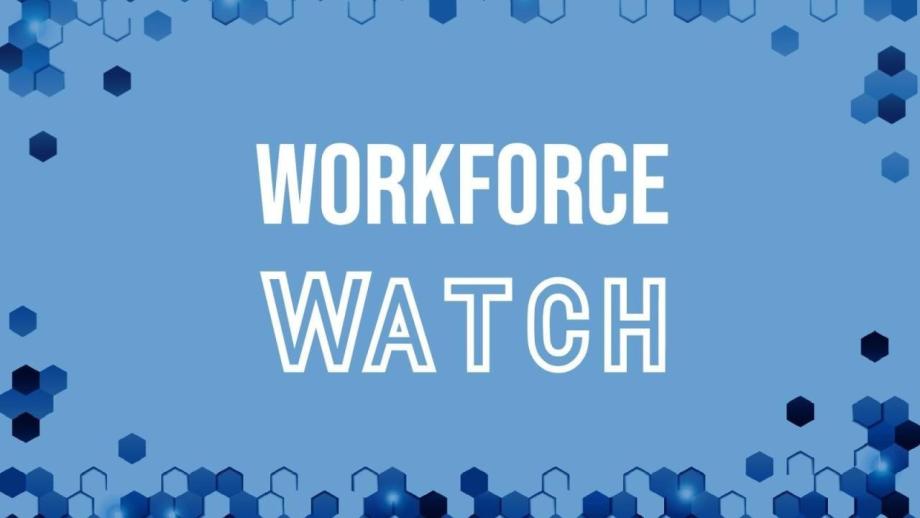As the pace of AI transformation accelerates, organizations across every sector grapple with the same fundamental question: How do we prepare our people to thrive alongside artificial intelligence? From marketing to supply chains to HR, AI alters how tasks are done, decisions are made, and value is created. For business and talent leaders, that presents both an opportunity and a risk.
Any organization — whether business, higher education, non-profit, or government — risks their competitiveness, reputation, and even ROI if their workforce is not AI-ready.
At the Business-Higher Education Forum, we know that employers sit closest to the changes AI is driving in the workplace and which skills will matter most. We also know that higher education provides the reach, infrastructure, and credibility to scale solutions to prepare learners for the future of work.
Together, businesses and higher education become an unstoppable force for action.
The AI-Enabled Professional Framework
To cut through the hype and create a practical way to think about skills needed in an AI-transformed workplace, we partnered with leaders across industries and higher education to develop the AI-Enabled Professional Framework. This employer-validated and industry-agnostic framework gives companies and colleges a shared language for what it really means to be AI-ready, and, most importantly, gives a pathway to get talent there.
Informed by input from over a hundred cross-industry leaders, the AI-Enabled Professional Framework identifies the human and technical competencies people need to use AI thoughtfully, responsibly, and effectively. And, while it was built for today’s generative AI environment, the framework is designed to evolve as technology advances.Seven Core Competencies
At its heart, the framework defines seven essential competencies that every worker, from entry-level to executive, needs to thrive in an AI-augmented workplace.
AI Literacy: Understand what AI is, how it works, and where it fits into an employee’s role. This competency prevents misuse and helps people innovate with confidence.
Data Literacy: Understand and interpret data to make AI insights actionable. This competency bridges intuition and evidence to empower smarter, data-informed decisions.
Critical Thinking, Problem-Solving and Creativity: Evaluate AI-generated outputs, spot flawed reasoning, and prompt systems in ways that lead to better answers. This competency anchors discernment and logic.
Ethics, Governance and Responsible AI Use: Spot bias, ensure transparency, and uphold compliance. This competency safeguards equity, accountability, and public trust.
Digital and Computational Skills: Navigate digital environments, interpret automation logic, and understand how computational systems function. This competency encourages sustained fluency with core digital tools and the ability to work effectively with the platforms that power AI applications.
Collaboration and Communication: Communicate across functions, translate technical information, and collaborate with colleagues and AI systems. This competency ensures professionals can work effectively within hybrid (AI + human) environments.
Adaptability and Continuous Learning: Cultivate the mindset to learn, unlearn, and pivot. This competency ensures human and organizational resilience as technology and business models advance quickly.
Together, these competencies form a human-centered roadmap to build an AI-enabled workforce that can guide, question, and unlock the value of AI.
Meet People Where They Are
AI readiness looks different depending on where someone is at in their career. That’s why the framework maps competencies across five career stages:
An early-career employee may engage with AI primarily as a tool, using it to automate tasks, draft content, or conduct research. Mid-career professionals, by contrast, are more likely to integrate AI into strategic processes or team-based decision-making. Senior leaders, meanwhile, are increasingly expected to make decisions that influence enterprise-wide AI adoption, assess risk, shape workforce strategies, and model responsible use.These career stages are not meant to demonstrate a career pathway. Rather, by clearly articulating how AI competencies evolve across discrete career stages, this framework enables organizations to tailor upskilling efforts to the right audience, at the right depth, and with the right outcomes in mind. For employers, this means investing resources where they will have the most impact, ensuring that AI skill-building aligns with both job function and business objectives. For higher education institutions, this provides a structured way to think about how AI-related learning unfolds across a student’s academic journey and how it can extend into continuing education and lifelong learning.
Why the Business-Higher Education Forum — and Why Now
We are uniquely positioned to make this framework actionable because we start where the demand signal originates: with business. Employers in our network define the competencies that matter most, and we convene higher education partners who can embed those competencies into programs, pathways, and credentials — quickly and with agility to meet the varied needs of today’s learners and workers.
That speed-to-action is our differentiator. In an era of extremely rapid technological advancement, business and education need to move together — quickly — to stay competitive and ensure we equip our people with the skills to succeed in the workforce of the future.
A Framework for Action
The AI-Enabled Professional Framework is designed to be a practical, flexible, and usable tool for action. We are releasing this tool publicly to help organizations at every stage of AI readiness be more intentional about decisions on talent development, hiring, and education.
For employers, the framework can:
- Inform how AI competencies are embedded across the talent lifecycle
- Guide the creation of skill profiles for emerging roles
- Build smarter interview and evaluation rubrics and tailor performance expectations across job levels.
For higher education, the framework can:
- Provide a roadmap to align programs with workforce needs
- Inform curriculum review and re-design
- Support the design of flexible, stackable credentials that respond to industry demand
Take the Next Step
AI advancements are moving faster than most skilling strategies. Closing this gap requires intention, clarity, and collaboration across business and higher education. We developed the AI-Enabled Professional Framework so employers and educators speak the same language and work quickly and collaboratively to prepare learners and workers at every stage of their career.
This launch is an important milestone, and it’s just the beginning. With our network of innovative companies and forward-looking institutions, we are putting the framework into action to benefit learners, workers, businesses, and our economy.
- Subscribe to our mailing list to learn more about the framework and how leading employers and institutions are deploying it for success.
- Are you an innovative corporate or college leader? Join us in this work — learn more about our network here.
AI-Enabled Professional Competencies Framework © 2025 by Business-Higher Education Forum is licensed under CC BY-NC-SA 4.0
